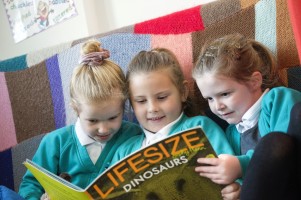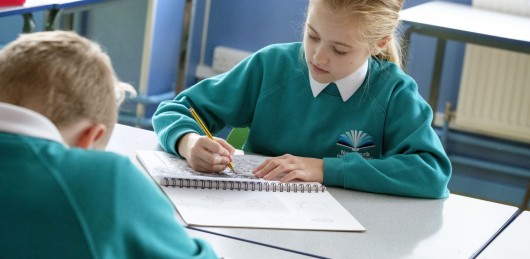More in this section...
English
Books and reading are at the very heart of our school and curriculum. Through reading and being read to, our children develop the ability to think critically and will reflect and grow; morally, socially and cognitively.
Novel Study
The development of core English skills (Oracy, Reading, Writing, Grammar, Punctuation and Spelling) flows from our “Novel Study” approach. Children in every year group spend extended periods of time studying high-quality texts (both picture books and novels) and from these develop insight, empathy and nuanced degrees of comprehension and inference. Children become the protagonists in the texts they study, experiencing the same emotions, dilemmas and character traits. This in-turn helps them learn to be passionate and creative writers, drawing on a rich history of literature to create their own works. Books are carefully chosen to introduce children to diverse cultures, time periods, character arcs and storytelling devices. Deep analysis of literature enables children to access the big questions about life and exploration of character, theme, setting and plot allows children to wrestle with and respond to challenging situations and emotions in a safe and secure environment.
Central to our Novel Study approach is Reader Response Theory; the idea that reading is a dynamic, two-way process (the coming together of the text and the reader). The reader (or listener when we read aloud to children is an ‘active agent’ who continuously makes meaning through engaging with the text. Even in picture books, the reader must engage their own imagination to fill in the details left out by the author. This process of ‘making meaning’ is affected by reader context, disposition, age, and life experience.
Children’s writing develops holistically as a natural and meaningful response to reading the chosen text. The quality and range of responses reflect a deeper understanding of language and context. Children are introduced to text types that link to the text they are studying eg. persuasive letters to characters, diary entries and newspaper reports. Through studying books in great depth, children develop a nuanced understanding of theme and narrative structures. We are very particular about the books we choose for Novel Study and class reads and ensure there is a wide and diverse range of protagonists, plot types, genres, settings and authors for our children to experience.
In practice, we focus on one novel or text for an extended period of time, allowing considerable in-depth analysis. Every child has a copy of the text to explore and learning takes place through immersion, collaboration, dramatic retelling and expert reading. There is an explicit focus on language analysis and authorial intent, especially sentence and word level choices (tier two vocabulary). Drama strategies such as hot-seating and freeze-framing are integrated into classroom practice.
Reading
Developing accomplished and confident readers is critical to our success. All children follow a levelled reading scheme as they develop their decoding and comprehension skills and every child reads aloud to an adult at least once per week. In EYFS and KS1, and for older children who are in the early stages of reading, children read aloud to an adult more frequently. Every child takes two books on loan from the school library at a time; one book that is chosen by the child and one levelled book that matches the child’s phonological development.
Phonics
Learning to read is the most important skill children will learn during their early schooling and has far-reaching implications for lifelong confidence and well-being. In order to read and understand texts children must learn to recognise/decode the words on the page. We use the Little Wandle phonics scheme. You can learn more on their website here.
Guided Reading
Whole-class guided reading lessons take place on a weekly basis in KS2 and will have a specific focus on acquiring and mastering tier 2 vocabulary.
Vocabulary can be organised into 3 tiers:
- Tier 1 – high frequency in spoken language (table, slowly, write, horrible)
- Tier 2 – high frequency in written texts (gregarious, beneficial, required, maintain)
- Tier 3 – subject specific, academic language (osmosis, trigonometry, onomatopoeia)
By the age of five most new vocabulary is acquired through reading. Most children will quickly pick up new tier 1 words through everyday conversation with their peers and through listening to their teacher and other adults in school. Tier 3 language is taught explicitly in subject-specific lessons within school. Our priority in guided reading lessons is broadening children’s tier 2 vocabulary.
Teachers identify specific tier 2 vocabulary from the class Novel Study. Children explore this language through a range of strategies; generating synonyms, ‘drawing’ the word, orally rehearsing pronouncing the word and using it in a range of correct and incorrect contexts. Children learn to recognise, pronounce, define and use this vocabulary correctly and confidently.
Class reads play a crucial role in our reading strategy. Every class has a dedicated time in the school day to stop and listen to an expert reader (their teacher) read them a story. Children are drawn into stories by skilful reading and experience the joy and magic of reading on a daily basis. Whenever a class read is finished, the book is added to the class library, ready for children to borrow and share it at home with their families. In this way we also broaden children’s reading diets, by choosing books and authors they are unfamiliar with.
Grammar, Punctuation and Spelling
Discrete grammar, punctuation and spelling lessons are taught separately from the Novel Study curriculum. These weekly lessons ensure children embed this knowledge and practise using grammatical features and spelling rules in isolation, before applying their skills in written work across the curriculum. Weekly handwriting practise develops consistency in letter formation and cursive writing.






